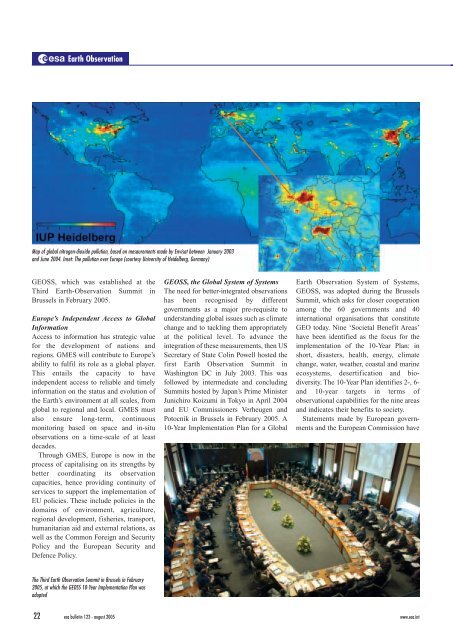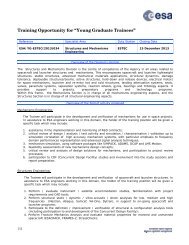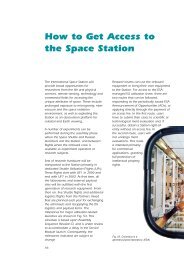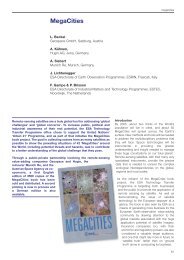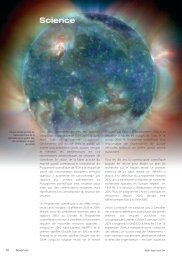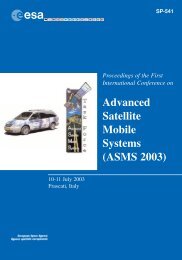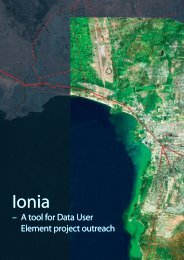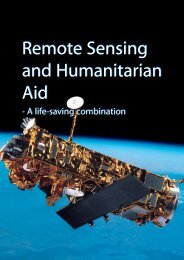Global Monitoring for Environment and Security Global ... - ESA
Global Monitoring for Environment and Security Global ... - ESA
Global Monitoring for Environment and Security Global ... - ESA
You also want an ePaper? Increase the reach of your titles
YUMPU automatically turns print PDFs into web optimized ePapers that Google loves.
Earth Observation<br />
Map of global nitrogen-dioxide pollution, based on mesaurements made by Envisat between January 2003<br />
<strong>and</strong> June 2004. Inset: The pollution over Europe (courtesy University of Heidelberg, Germany)<br />
GEOSS, which was established at the<br />
Third Earth-Observation Summit in<br />
Brussels in February 2005.<br />
Europe’s Independent Access to <strong>Global</strong><br />
In<strong>for</strong>mation<br />
Access to in<strong>for</strong>mation has strategic value<br />
<strong>for</strong> the development of nations <strong>and</strong><br />
regions. GMES will contribute to Europe’s<br />
ability to fulfil its role as a global player.<br />
This entails the capacity to have<br />
independent access to reliable <strong>and</strong> timely<br />
in<strong>for</strong>mation on the status <strong>and</strong> evolution of<br />
the Earth’s environment at all scales, from<br />
global to regional <strong>and</strong> local. GMES must<br />
also ensure long-term, continuous<br />
monitoring based on space <strong>and</strong> in-situ<br />
observations on a time-scale of at least<br />
decades.<br />
Through GMES, Europe is now in the<br />
process of capitalising on its strengths by<br />
better coordinating its observation<br />
capacities, hence providing continuity of<br />
services to support the implementation of<br />
EU policies. These include policies in the<br />
domains of environment, agriculture,<br />
regional development, fisheries, transport,<br />
humanitarian aid <strong>and</strong> external relations, as<br />
well as the Common Foreign <strong>and</strong> <strong>Security</strong><br />
Policy <strong>and</strong> the European <strong>Security</strong> <strong>and</strong><br />
Defence Policy.<br />
The Third Earth Observation Summit in Brussels in February<br />
2005, at which the GEOSS 10-Year Implementation Plan was<br />
adopted<br />
GEOSS, the <strong>Global</strong> System of Systems<br />
The need <strong>for</strong> better-integrated observations<br />
has been recognised by different<br />
governments as a major pre-requisite to<br />
underst<strong>and</strong>ing global issues such as climate<br />
change <strong>and</strong> to tackling them appropriately<br />
at the political level. To advance the<br />
integration of these measurements, then US<br />
Secretary of State Colin Powell hosted the<br />
first Earth Observation Summit in<br />
Washington DC in July 2003. This was<br />
followed by intermediate <strong>and</strong> concluding<br />
Summits hosted by Japan’s Prime Minister<br />
Junichiro Koizumi in Tokyo in April 2004<br />
<strong>and</strong> EU Commissioners Verheugen <strong>and</strong><br />
Potocnik in Brussels in February 2005. A<br />
10-Year Implementation Plan <strong>for</strong> a <strong>Global</strong><br />
Earth Observation System of Systems,<br />
GEOSS, was adopted during the Brussels<br />
Summit, which asks <strong>for</strong> closer cooperation<br />
among the 60 governments <strong>and</strong> 40<br />
international organisations that constitute<br />
GEO today. Nine ‘Societal Benefit Areas’<br />
have been identified as the focus <strong>for</strong> the<br />
implementation of the 10-Year Plan: in<br />
short, disasters, health, energy, climate<br />
change, water, weather, coastal <strong>and</strong> marine<br />
ecosystems, desertification <strong>and</strong> biodiversity.<br />
The 10-Year Plan identifies 2-, 6<strong>and</strong><br />
10-year targets in terms of<br />
observational capabilities <strong>for</strong> the nine areas<br />
<strong>and</strong> indicates their benefits to society.<br />
Statements made by European governments<br />
<strong>and</strong> the European Commission have<br />
22 esa bulletin 123 - august 2005 www.esa.int


